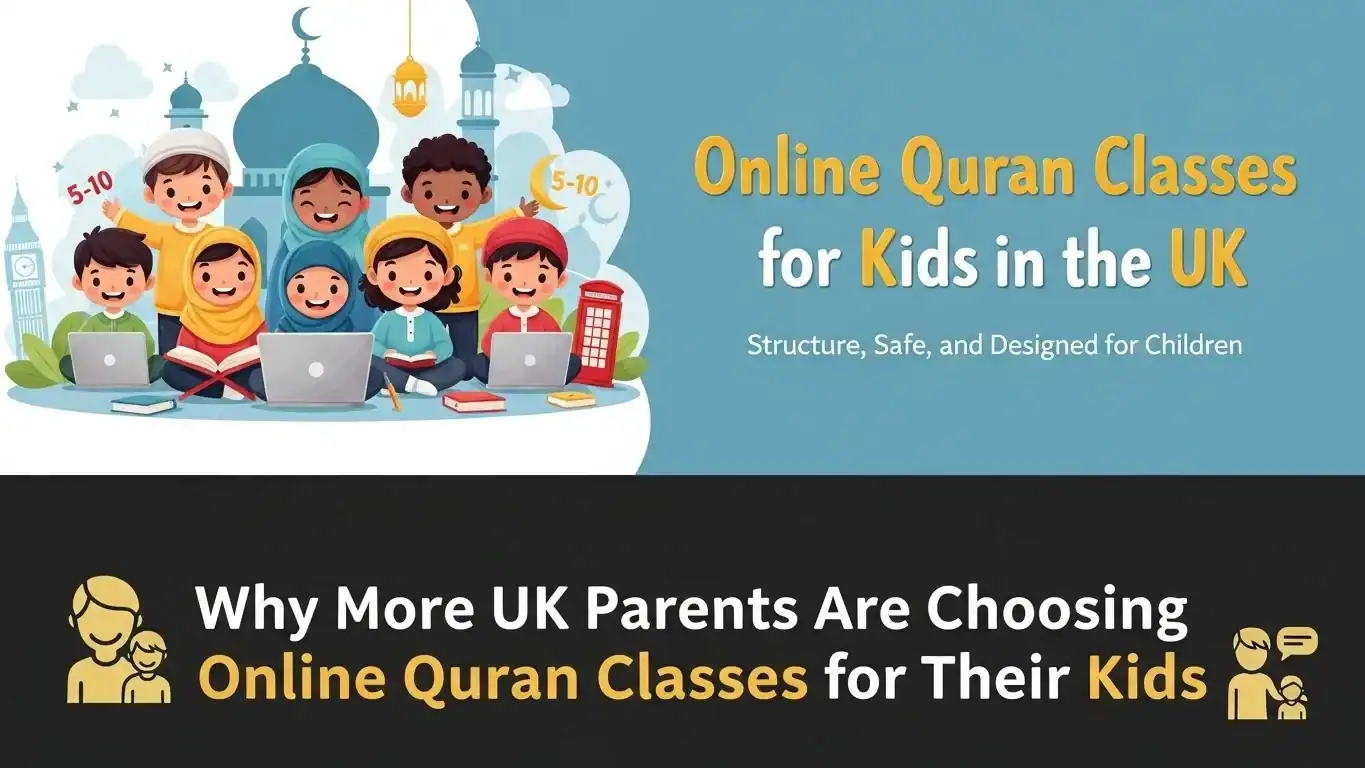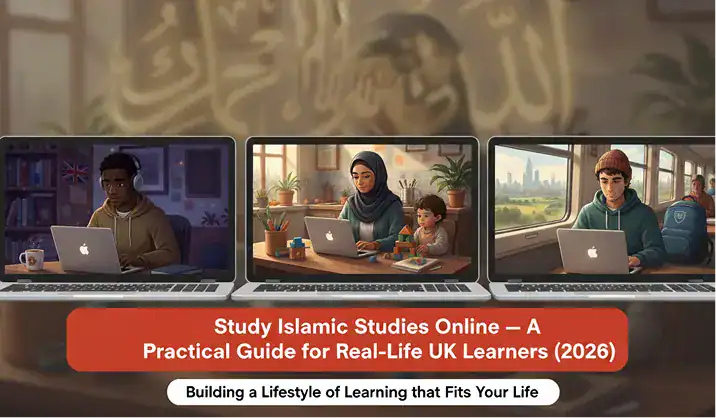Learning Quran for kids is now easier, safer, and more engaging with Online Quran Classes designed for children.
Whether your child is a beginner r already reading short Surahs, a personalized and loving approach makes learning joyful.
With Azhar-certified teachers guiding them from home, children build a strong Quran foundation filled with purpose and confidence.
Why Should Children Learn the Quran from an Early Age?
Building a strong relationship with the Quran during childhood lays a foundation for life.
- Kids absorb language, rhythm, and pronunciation faster than adults
- Learning Quran builds discipline, focus, and character
- Early exposure strengthens Islamic identity and connection with Allah
- It develops emotional bonding through stories, recitation, and reflection
This is why parents around the world search for the best way to teach Quran to children — whether it’s through home practice or professional online Quran education for kids.
Best Methods for Learning Quran for Kids:
There is no single “right” way to teach the Quran. What matters most is adapting the method to suit your child’s age, level, and learning style.
- For toddlers and preschoolers (ages 3–6)
- Use repetition, melody, and short verses
- Introduce the Quran through stories and sounds
- Keep sessions short
(5–10 minutes) and joyful
- For primary-aged children (ages 7–12)
- Begin structured lessons with Arabic letters and Tajweed basics
- Practice reading and listening daily with guided recitation
- Include meaning through storytelling and simple tafsir
- For teens (ages 13+)
- Focus on fluency, memorization, and understanding
- Encourage deeper discussions and application in life
- Offer opportunities for Quran recitation in family or community settings
Best Quran Learning Approach by Age:
| Age Group | Method | Focus |
| 3–6 years | Repetition, melody, short verses | Love & bonding with Quran |
| 7–12 years | Tajweed basics, daily recitation, stories | Reading & understanding |
| 13+ years | Fluency, Hifz, Tafsir basics | Application & deeper study |
Is Online Quran Learning Effective for Kids:
Absolutely — if the program is designed properly.
Online Quran classes are one of the best ways for Learning Quran for Kids especially when the program is designed properly.
- 1:1 sessions ensure personal attention and pacing
- Visual tools and interactive boards make learning fun
- Kids feel safe and relaxed in their own environment
- Parents can monitor sessions live or through progress reports
At Quranic Mind learning Quran for kids isn’t just about teaching — it’s about inspiring a love for the Quran.
Why Choose Our Online Learning Quran for kids?
At Quranic Mind we make Learning Quran for Kids joyful, structured, and effective.
That’s why we offer:
- Azhar-certified tutors with excellent English and child training
- Tailored learning plans based on each child’s starting point
- 1-on-1 live sessions that allow full focus on your child
- Games, visuals, and activities that build engagement
- Weekly feedback sent to parents to track progress
Your child doesn’t need to catch up to anyone else — they grow at their own pace.
What Will Your Child Learn in Our Online Quran Classes?
Our curriculum adapts to every child — from early learners to advanced readers.
For beginners:
- Arabic alphabet (noorani or Noor Al Bayan methods)
- Quran phonics and basic reading rules
- Short verses and Surahs from Juz Amma
- Daily pronunciation correction using audio and visual feedback
For intermediate levels:
- Full Quran reading with fluency and Tajweed
- Memorization of selected Surahs
- Meaning-based understanding for better retention
For advanced students:
- Quran Hifz with proper structure and pacing
- Application of Tajweed rules while reciting
- Tafsir basics for kids
(age-appropriate explanations)
Whether it’s your child’s first time with the Quran or they’re revising, the journey is made simple, guided, and rewarding.
Kids Learning Quran at Home: How to Support Them as a Parent
Even if you don’t speak Arabic fluently, you can support your child’s Quran journey at home.
- Set a regular time for classes or revision
- Celebrate small wins (1 verse, 1 page, 1 Surah)
- Encourage daily listening to kids’ Quran recitation
- Read simple translations together in your language
- Use a children’s Quran with large text and colorful visuals
Parental involvement — even if minimal — helps reinforce consistency and motivation.
Learn Quran for Children with Azhar Teachers from Home
Our tutors are:
- Graduates of Al-Azhar University, trained in Tajweed and pedagogy
- Fluent in English and experienced with non-Arabic-speaking families
- Trained to handle young learners with patience and creativity
We also offer:
- 2 Free Trial Classes before enrolling
- Flexible timing, including evenings and weekends
- Female tutors for girls (upon request)
- Continuous performance tracking and progress reports
Your child will receive full support every step of the way
👉 Want to see how Quranic academy makes a difference? Start your free trial today with our Online Quran Classes for Kids and let your child experience joyful Quran learning.
Quran Hifz for Kids: Structured, Gentle, and Motivating
Many parents ask: How can my child start memorizing the Quran?
We break Hifz down into achievable, confidence-building steps:
- Start with short Surahs (Surah Al-Fatiha, Al-Ikhlas, An-Nas)
- Use daily repetition, audio tools, and verbal review
- Create a light revision routine (5–10 minutes daily)
- Use rewards and fun charts to show milestones
Our teachers make kids’ Quran memorization a joyful and meaningful goal — not a burden.
Children Reading Quran: How to Build Fluency Over Time
Reading takes time — and consistency matters.
- Daily 15–30 minute sessions are better than long weekly classes
- Pronunciation improves with teacher-led correction and audio review
- Reading aloud builds confidence, memory, and voice control
Whether it’s child reading Quran for the first time or polishing their fluency, we support every stage with patience and structure.
Why Quranic academy is the Best Choice for Your Child’s Quran Learning
At Quranic Mind we’re not just another online Quran platform — we’re a team of passionate educators committed to delivering the best Quran education for children in the UK and beyond.
Here’s what sets us apart:
- 🎓 All teachers are Azhar graduates
- 🎮 Classes include interactive tools and activities
- 🕰️ 100% flexible scheduling
- 🧒 Lessons for all age groups (3–16)
- 🌍 Available worldwide with 24/7 support
- 🎁 Two free trial lessons — no commitment required
- 👨👩👧 Live parent updates and progress tracking
When you choose Quranic academy you’re choosing trust, quality, and care
Parents around the world trust Quranic academy for their children’s Quran journey. Read their testimonials to see how our classes make a real difference.
Ready to Start Learning Quran Online for Your Kids?
Learning Quran for kids is a lifelong gift — and the earlier they start, the stronger their connection becomes. With Qurani s trusted teachers, flexible classes, and supportive methods, your child can learn Quran with joy, discipline, and love.
👉 Start your child’s Quran journey today with Online Quran Classes
2 free trial lessons included!
Frequently Asked Questions:
How to learn Quran for kids if the parent doesn’t know Arabic?
You don’t need to teach yourself — enroll your child in online Quran classes with experienced teachers. Parents can support by reviewing the lessons or listening together.
What is the best age to start teaching Quran to children?
Age 4–5 is ideal for listening and memorization. Age 6–7 is great for reading and Tajweed. But it’s never too early or too late to start.
Can children really learn Quran online effectively?
Yes. With the right teachers, tools, and structure — many kids thrive online more than in traditional classrooms.
How long will it take my child to learn to read the Quran?
It depends on the child’s age and consistency. Most children start reading short Surahs within 2–4 months.
Is there Hifz support for kids who want to memorize the Quran?
Yes! We offer structured memorization programs with regular revision and personal encouragement from dedicated teachers.
Have questions? Chat with us directly on WhatsApp and get instant support for your child’s Quran learning journey.





3 Responses
4 years old wanted to learn the Qur’an
Assalamu Alaikum Aysha,
That’s wonderful! We would love to help your 4-year-old start learning the Qur’an. 🌿✨ To make sure you find the best teacher for your child, we offer two free trial sessions where you can meet different teachers and choose the one that suits your child best.
Feel free to contact us on WhatsApp at +442070976739 to schedule the trial sessions at a time that works for you. Looking forward to hearing from you!
JazakAllah Khair. 😊